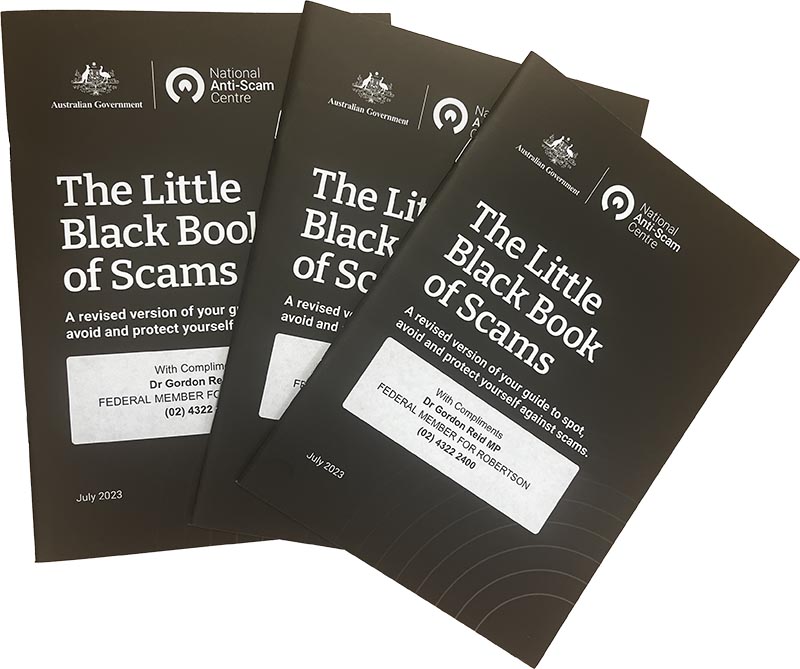
Bottom-feeders
who prey on human gullibility
Scams are rampant, with new ones popping up all the time as scammers adapt to new technologies, the latest trends and current events. They are the low-life, bottom-feeders of humanity, who do not care whose life they destroy, as long as they fill their pockets with gold.
Every day, scammers' are ripping money out the pockets of hard-working Australians, and the Federal Government is now fighting back.

17 April 2024
ALAN HAYES
WHEN life was much simpler, before the advent of email and smart phones [mobile computers in the palm of your hand] scamming people on a ‘fire-sale’ basis was unheard of. Sure, there have always been tricksters and grifters, willing to relieve some unsuspecting ‘rube’ [an awkward unsophisticated, naive, or inexperienced person] from their life savings – buying the Sydney Harbour Bridge, the clock tower of the then Sydney General Post Office, or tracts of government land – but these weren’t wholesale swindles like they are today.
The problem we have today is the fact that society has embraced technology at a fierce rate – try and talk to a government department, a Telco, an energy provider, and the list goes on, by making a simple telephone call. You have a better chance of winning first prize in power ball, and the odds in doing that are ‘one in 134 million’.
Everyone today wants you to use the internet, in particular an ‘App’ on your mobile phone, or text or email. Little wonder scams are rampant – they’re almost a licence to print, unhindered, unlimited bundles of money. And as technology improves, so do the scams – becoming more and more sophisticated.
So, what can be done?
People across the Central Coast community have no doubt experienced the persistent calls, texts, and social media accounts attempting to scam them out of money.
To inform ‘Coasties’ as to what can be done to help them avoid falling victim to a scammer, Assistant Treasurer, Stephen Jones visited the Central Coast for a community Scams Forum, which was held at Umina Beach.
The forum was an opportunity for people to learn ways to protect themselves from scams, know what to do if they are targeted by a scam, and hear about the steps the government is taking to crackdown on this crime.
Prior to the current government coming into office, Australians were losing over $3 billion a year to scams. Of particular concern, scam losses had doubled and doubled again in the space of three years.
That trend has now flipped, and losses have significantly reduced in the first six months of the Government’s crackdown. In November 2023, scam losses decreased by over 50% compared with November 2022.
Federal Member for Robertson, Dr Gordon Reid said “Our community and local businesses are more protected from scammers than ever before with the establishment of the National Anti-Scams Centre.”
“Every day, scammers are ripping money out the pockets of hard-working Australians. The Government is fighting back," he said.
“If an offer seems too good to be true or suspicious, it probably is."
The Federal Government is implementing an ambitious anti-scam agenda to combat scams and protect Australians.
The first phase was setting up the National Anti-Scam Centre (NASC) in July last year, which was part of an $86.5 million investment to fight scams and online fraud in the May Budget.
This announcement included:
- $58 million for the ACCC to establish the National Anti-Scam Centre;
- $17.6 million for ASIC to bust fake investment websites that promote fake scams; and
- $10 million for ACMA to establish and enforce an SMS sender ID registry to stop scam texts.
Phase two of the government's anti-scam plan will include developing mandatory industry codes to impose tough new obligations on banks, telcos, and social media platforms to protect their customers from scams.
The NASC means that the people of the Central Coast can look to a trusted, centralised point within Government for information and education to protect themselves from scams.
It is more important than ever that the Central Coast community is alert to scams and are aware of how to protect themselves.
Identifying a scam
Although the variety of scams can seem endless, there are some common characteristics that can help you recognise and avoid a scam.
Be on the lookout for these red flags:
- Being asked to pay money in order to receive a prize or get a job
- Pressure to act immediately
- Use of scare tactics, e.g. telling you a loved one is in danger, that your computer has been hacked or threatening arrest if you don’t act now
- Insistence that you wire money or pay by gift card
- Insistence that you pay an outstanding invoice or fine
- Receiving a cheque or overpayment and being asked to wire a portion of the funds back
- Being asked to provide your password, PIN, bank account number or financial information to someone who contacts you out of the blue
- Get-rich-quick and other promises that sound too good to be true
- Romance scams - never assume a person that you've only met online is who they say they are. Scammers go to great lengths to convince you the relationship is real and manipulate you to give them money. Romance scammers will leave you broke and broken-hearted.
But it doesn’t stop there. The latest scam is the property scam! The invoice for the conveyancing and even the property settlement doesn’t come from your conveyancer, it comes from the scammer. The conveyancer’s email address has been compromised and the invoice sent to you was created so that it looks genuine - reflecting a bank account that the scammers want the money transferred to.
These opportunistic low-lives are only interested in a substantial payday – check with your conveyancer or solicitor first before you willingly hand over your money.
How do you know if you are dealing with a scammer?
You might be dealing with an online scammer if they request sensitive personal information, money, or insist on speaking on a chat App of their choice, or if they request sensitive personal information, money, or insist on speaking on a 'Chat App' of their choice.
Always stop, think and check before you act. Scammers rely on you not spotting the warning signs because you're in a hurry, you don't want to miss something that looks like a great deal, or because it seems like it's from someone you trust.

The Little Black Book of Scams is recognised internationally as an important tool for consumers and small businesses to learn about scams including: the most common scams to watch out for; the different ways scammers can contact you; the tools scammers use to trick you; the warning signs; how to protect yourself; and where you can find help.
What to do
Scammers will continue to pester you in the hope that one day you'll fall for their hoax. Never give out personal information. Refrain from sharing any data. Even telling a scammer where you live or disclosing your email address can help them find other pieces of your identity on social media or from lists on the Dark Web.
If you are not sure whether a contact or solicitation is legitimate, hang up the phone, or, if it’s an email or text, do not reply, click on any links or download any attachments. Then, look up the actual contact information of the company or organisation and call that number to verify whether you need to take any action or provide any information.
Never forget, scammers can be very convincing - that telephone call, email, and text message trying to get your money or personal information is more than likely a scammer.
Report a suspected scam to SCAMWATCH – they are there to help you.
You can also obtain a free copy of ‘The Little Black Book of Scams’ from the office of the Member for Robertson, Dr Gordon Reid – Telephone 4322 2400.








.jpg?crc=4257584689)










_web.jpg?crc=282450513)



